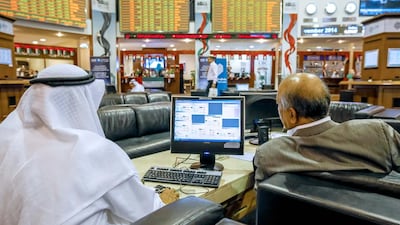UAE stock indexes, among the world’s best performers this year, fell for the second day as the price of oil slumped to a five-year low.
Emaar, the biggest property developer in the UAE, also weighed heavily yesterday on the drop as the stock traded ex-dividend, the first day without its Dh1.257 dividend paid to investors, shaving 10 per cent off its market value.
The UAE is the world’s eighth biggest oil producer and the federal government funds more than 60 per cent of its budget from crude exports.
The Dubai Financial Market General Index closed 2.2 per cent lower, firming after falling as much as 4 per cent in early trading.
That brings its two-day decline to 6.7 per cent, and taking the measure inches away from a bear market as it drops almost 20 per cent from its September high.
The Abu Dhabi Securities Exchange General Index declined 0.19 per cent, bringing its five-day drop to 6 per cent.
“Oil has something to do with it but it’s also that Emaar has gone ex-dividend,” said Simon Kitchen, the chief strategist at the Egyptian investment bank EFG Hermes.
“You have dividend season starting soon and you have quite a few stocks that have decent yields.
"So investors will be focusing on the stocks in December and will be expecting to get the dividends in the first months of 2015. So you have stocks like Air Arabia, RAKbank. These are among two we like that have decent dividend yields." Dubai Islamic Bank, the biggest Sharia-compliant lender in Dubai, fell 2.1 per cent to Dh6.9 while National Central Cooling or Tabreed shed 3.7 per cent to Dh1.32.
In Abu Dhabi, Eshraq Properties slumped 4.2 per cent to 91 fils, while ADCB decreased 4 per cent to Dh6.66.
The drop in UAE stocks comes as oil has shed almost 40 per cent of its value since June amid increasing production in countries such as the US and waning demand amid a global economic slowdown.
Still, after yesterday’s drop, Dubai’s stock index is up 24 per cent this year, making it the sixth best-performing measure in the world.
Stocks in Dubai and Abu Dhabi have been buoyed in the past two years by an uptick of business in the Emirates following years of slow growth in the aftermath of the 2008 global financial crash.
Government spending on infrastructure, investments into real estate and stocks from buyers in other emerging markets such as Russia, Saudi Arabia and China has given a boost to the country’s economy. “The impact of the oil drop is a tricky one because, for example, the UAE has a lot of savings set aside but Dubai growth has been supported in recent years by consumers from Russian and Saudi Arabia who come to Dubai Mall, who buy real estate,” said Mr Kitchen.
“The Russian consumers have been hit by the devaluation of their currency and consumers in Saudi Arabia are waiting to see what happens with the budget next year.”
mkassem@thenational.ae
Follow The National's Business section on Twitter

